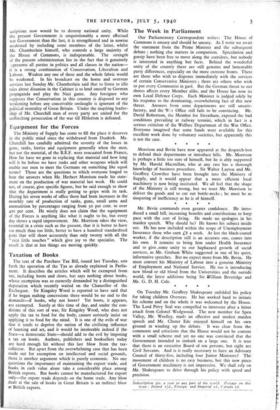Taxation of Books
The text of the Purchase Tax Bill, issued last Tuesday, sets forth the operation of the Tax as already explained in Parlia- ment. It describes the articles which will be exempted from tax, including boots and shoes, but says nothing about books, whose exemption was so earnestly demanded by a distinguished deputation which recently waited on the Chancellor of the Exchequer. Sir Kingsley Wood is reported to have said that if he began making concessions there would be no end to the demands—if books, why not boots? Yet boots, it appears, are exempted. Surely at this time of day, and under the con- ditions of this sort of war, Sir Kingsley Wood, who does not apply the tax to food for the body, cannot seriously insist on applying it to food for the mind. It is one of the evils of war that it tends to deprive the nation of the civilising influence of learning and art, and it would be intolerable indeed if the State—a democratic State—should add to the evil by imposing a tax on books. Authors, publishers and booksellers today are hard enough hit without this last blow from the tax- collector. But apart from the overwhelming case that has been made out for exemption on intellectual and social grounds, there is another argument which is purely economic. No one questions the importance of maintaining the export trade, and books in cash value alone take a considerable place among British exports. But books cannot be manufactured for export only—the export trade depends on the home trade. Any blow .dealt at the sale of books in Great Britain is an indirect blow at British exports.






























 Previous page
Previous page